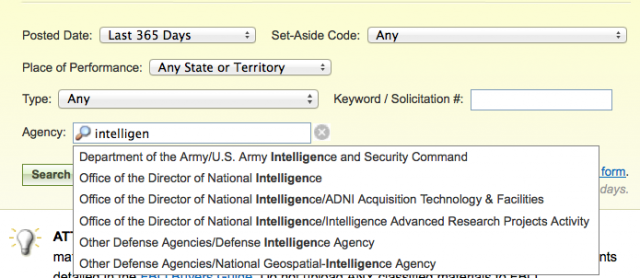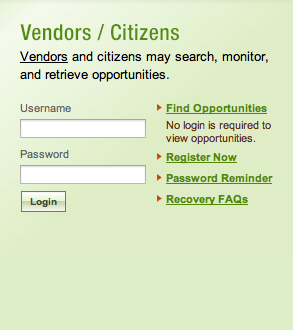 Over the last year, thousands of pages of sensitive documents outlining the government’s intelligence practices have landed on our desktops.
Over the last year, thousands of pages of sensitive documents outlining the government’s intelligence practices have landed on our desktops.
One set of documents describes the Director of National Intelligence’s goal of funding “dramatic improvements in unconstrained face recognition.” A presentation from the Navy uses examples from Star Trek to explain its electronic warfare program. Other records show the FBI was purchasing mobile phone extraction devices, malware and fiber network-tapping systems. A sign-in list shows the names and contact details of hundreds of cybersecurity contractors who turned up a Department of Homeland Security “Industry Day.” Yet another document, a heavily redacted contract, provides details of U.S. assistance with drone surveillance programs in Burundi, Kenya and Uganda.
But these aren’t top-secret records carefully leaked to journalists. They aren’t classified dossiers pasted haphazardly on the Internet by hacktivists. They weren’t even liberated through the Freedom of Information Act. No, these public documents are available to anyone who looks at the U.S. government’s contracting website, FBO.gov. In this case “anyone,” is usually just contractors looking to sell goods, services, or research to the government. But, because the government often makes itself more accessible to businesses than the general public, it’s also a useful tool for watchdogs. Every government program costs money, and whenever money is involved, there’s a paper trail.
FBO.GOV
![]() FedBizOpps—which would make a great name for a Capitol Steps hip-hop spin-off crew—is the hub for all government contracting documents, including RFPs (requests for proposals), RFIs (requests for information), “industry days,” and awards (when the government picks a contractor). There are a few different ways to access the information at FBO.gov, so let’s start with a basic search.
FedBizOpps—which would make a great name for a Capitol Steps hip-hop spin-off crew—is the hub for all government contracting documents, including RFPs (requests for proposals), RFIs (requests for information), “industry days,” and awards (when the government picks a contractor). There are a few different ways to access the information at FBO.gov, so let’s start with a basic search.
Searching for records
If you’re just browsing on the fly, your best bet is to start with the quick search on the front page of FBO.gov. You only really need to play with two of the fields—“Keyword” and “Agency”—although it works best if you only use one at a time.

With keywords, you’ll get the better results if you stick to a single word. For example, words like “unmanned” will turn up drone projects, and “SIGINT” will bring up signal intelligence (a form of electronic surveillance) programs. You can use broader terms like “surveillance,” keeping in mind that you will also have to sift through medical program records, since that term is also used by the health sector. For multi-word search terms—such as license plate readers or facial recognition—FBO’s search recognizes Boolean operators.

Sometimes you won’t know what you’re looking for, especially if an agency is using obscure technical terminology to describe the project. So, instead of searching for what, you can search for who by filtering down to a specific agency. The FBI, the Office of the Director of National Intelligence, and U.S. Special Operations Command tend to produce interesting (and sometimes alarming) results. The Department of Homeland Security will also bring up interesting contracts, such as the recent short-lived call for private contractors to work on a national license plate recognition database, but you will have to search through a haystack of procurement documents for Coast Guard ship parts and detention center supplies. (As a side note: FBO.gov does not like web crawlers.)
When you view a particular “opportunity,” you will find some information on the main page, but often the most revealing information is contained in the supporting documents linked in the right-hand column of the page.
Setting up a citizen account
Running keywords one at a time can be a tedious task, especially if you want to search FBO.gov every day. The site also allows citizens to create user accounts similar to those of vendors, enabling you to track contracting opportunities through an online interface or by receiving email alerts when one of your filters is triggered. One additional benefit to registering an account is that, once you’re inside the system, you can review the list of vendors who have registered their interest in a project. (For example, here are the companies who want to help the Army’s Dugway Proving Ground in Utah test biological and chemical weapons on drones.)
 You will find the form to sign up for a citizen account on the front page of FBO.gov. Click “Register Now” and skip the steps that are only relevant for contractors. In some cases, you will need to enter your own name as the name of your company. You may need to input personal details, such as your address and phone number, so this method is not recommended if you’re not comfortable with the government knowing that you’re using the site.
You will find the form to sign up for a citizen account on the front page of FBO.gov. Click “Register Now” and skip the steps that are only relevant for contractors. In some cases, you will need to enter your own name as the name of your company. You may need to input personal details, such as your address and phone number, so this method is not recommended if you’re not comfortable with the government knowing that you’re using the site.
Once inside the interface, you will be able to put contracts on your “Watched List” and create permanent filters. Click “Search and Create Saved Searches,” select the “Search Agents” tab and then “Add New Search Agent.” You can set keywords for each agent, or you can select one or more agencies for a single search. Depending on how frequently you want the information, you will start getting emails with details and links that look like this:

When you find an intriguing item, you will want to add it to your watch list so you can track developments in the contracting process, including when new documents are uploaded, when the government answers questions submitted by bidders, and when a company is finally selected for a contract.
Other resources
If this guide wasn’t enough FBO.gov offers video tutorials on its system. Here are a few more companion resources that will help you track government spending.
 USASpending.gov – Although far from perfect or exhaustive, USASpending.gov is another way to investigate federal spending. This tool is particularly useful for examining the companies that bid on and win the contracts you’re tracking through FBO.gov. For example, if you know that AeroVironment won that Burundi-Uganda-Kenya drone contract, you may be curious to know how many other contracts the company has won, and from which other agencies. (Answer: 1,735 separate government transactions worth $1.7 billion with eight agencies, but mostly the Department of Defense.) Alternately, you can look up the top contractors for an individual agency, drilling down to a particular service, such as IT contracts with the FBI.
USASpending.gov – Although far from perfect or exhaustive, USASpending.gov is another way to investigate federal spending. This tool is particularly useful for examining the companies that bid on and win the contracts you’re tracking through FBO.gov. For example, if you know that AeroVironment won that Burundi-Uganda-Kenya drone contract, you may be curious to know how many other contracts the company has won, and from which other agencies. (Answer: 1,735 separate government transactions worth $1.7 billion with eight agencies, but mostly the Department of Defense.) Alternately, you can look up the top contractors for an individual agency, drilling down to a particular service, such as IT contracts with the FBI.
 Sunlight Foundation FBO Data – Last November, the Sunlight Foundation filed its first Freedom of Information Act lawsuit to obtain 10 years worth of historic FBO solicitation and award notices. Two days later, the government complied and Sunlight now offers the raw data in bulk.
Sunlight Foundation FBO Data – Last November, the Sunlight Foundation filed its first Freedom of Information Act lawsuit to obtain 10 years worth of historic FBO solicitation and award notices. Two days later, the government complied and Sunlight now offers the raw data in bulk.
 FBOpen – The General Services Administrations is piloting a new interface for FedBizOpps that may prove more user-friendly, although so far it offers few benefits over the main site.
FBOpen – The General Services Administrations is piloting a new interface for FedBizOpps that may prove more user-friendly, although so far it offers few benefits over the main site.
You can find all of EFF’s Sunshine Week posts linked here.



 || Join EFF
|| Join EFFSource: Electronic Frontier Foundation (EFF) – eff.org
Support InfoStride News' Credible Journalism: Only credible journalism can guarantee a fair, accountable and transparent society, including democracy and government. It involves a lot of efforts and money. We need your support. Click here to Donate